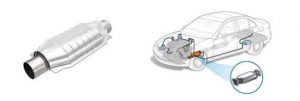DSP See Rise in Catalytic Converter Thefts from Vehicles
The Delaware State Police have recently noticed a rise in the theft of catalytic converters from vehicle exhaust systems. Honda CRV’s are the most common vehicle type being targeted right now, however several thefts have occurred involving various other makes and models as well.
The majority of theses thefts have occurred in large public parking lots to include retail locations, health care facilities and business parks. There is no specific time frame for the thefts as the incidents have occurred during the daytime as well as during the overnight hours.
The Appeal of Catalytic Converters
The reason is the value of the metals used in the manufacturing of the catalytic converters. Catalytic converters contain platinum, rhodium, and palladium. The metals are expensive, and thieves sell the converters to scrap yards. It can cost you on average up to $2000 to replace a catalytic converter, and it is illegal to drive your car without one. The resulting gap in your exhaust system also makes the car run poorly until it is fixed.
Thieves look for easy targets when it comes to catalytic converter theft, and a few simple steps help make your car or SUV a less likely target.
Symptoms of Converter Theft
You’ll notice a loud rumbling or roaring sound as soon as you turn on the engine if your catalytic converter is missing. This noticeable sound gets louder when you accelerate. Since the exhaust is not working properly, the vehicle also drives rougher than usual, often with a sense of sputtering as you change speed. Go to the back of the car and look underneath. The catalytic converter is a round canister that connects two pieces of piping in the exhaust. You will see a gap in the middle of your exhaust if the converter is missing, and you will likely see signs of the piping being cut away.

Preventing Catalytic Converter Theft
Always park in well-lit areas when possible. If you have a personal garage, keep your car in the garage with the door closed when the vehicle is not in use. Park close to a building entrance or to the nearest access road when parking in a public lot. This is due to the increased amount of pedestrian traffic in those areas.
Security devices are available that attach to the converter, making it harder to steal. Having the converter welded to the car frame also makes it more difficult to remove. If you have a security system on your car, calibrate it so vibration sets it off. This ensures the alarm activates if a thief tries to saw off the converter.
Video surveillance around your garage or driveway is also useful if you have the budget for it. Engrave your VIN number onto your catalytic converter to make it easier to identify in case it does get stolen.
See Something – Say Something
Despite all prevention methods the reality is that these thefts as well as other crimes do occur. If prevention is unsuccessful the next best tool to combating criminal activity is the reliance on victims and witnesses to report crimes in a timely manner and to provide as many investigative leads as possible.
Specific to catalytic converter thefts our community members are asked to be aware while walking in public and specifically while in large parking lots. If you see, or in these cases hear anything, (since power tools and saws must be used during the commission of the theft), alert someone immediately, either by calling 911 or notifying on-site security.
Be a good neighbor by being a good witness.
Anyone who believes they may have information related to these types of thefts are asked to contact the Troop 2 Criminal Investigations Unit by calling 302-365-8565.
Information may also be provided by calling Delaware crime stoppers at 1-800-TIP-3333 or via the internet at http://www.delaware.crimestoppersweb.com


